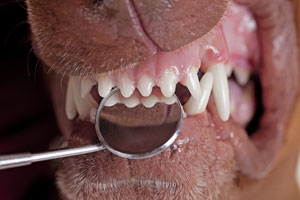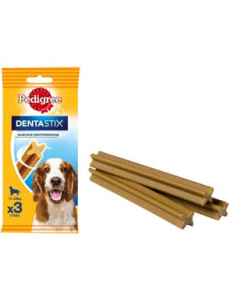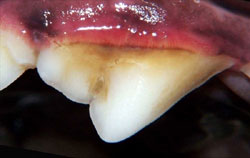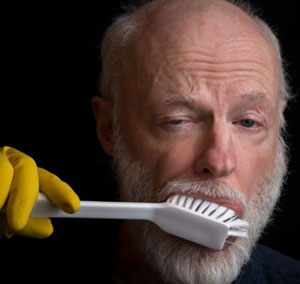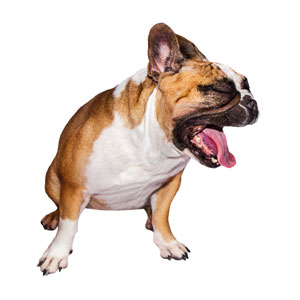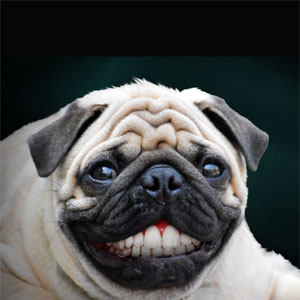Are Dentastix Good for my Dog and Teeth?
– Written by IC Koutzarov, owner Big Dog Company –
Introduction
February is “the month of teeth” for pets. And every year I am amazed that Pedigree's “Dentastix” is advertised. Also by veterinarians.
You can already taste it: I do not agree with this, and think that Dentastix is even harmful to your four-legged friend. Do you want to know why? Then read on.
What are Dentastix?
Dentastix are chewing sticks, approximately 20cm long and have a specific X-shape.
Pedigree, the maker of Dentastix, says that the teeth are cleaned by the "unique X-shape" of the Dentastix and by the "active ingredients that continue to work even after the stick is used up".
And, yes, they are right! It functions!
But do Dentastix really work because of the unique X-shape? Or is it the “active ingredients” that do the work? Which ingredients of Dentastix are those? And, what are the other ingredients of Dentastix.
And of course the most important question: Are Dentaxtix good for my dog?
What is Plaque or Tartar?
First something brief about plaque & tartar.
Dental plaque is a colorless, difficult to see layer on the teeth. If plaque is not removed, it can develop into tartar. Tartar is actually calcified dental plaque.
There are 4 ingredients needed to produce plaque:
- Bacteria (that naturally 'live' in the mouth)
- Carbohydrate
- Food scraps
- Saliva
When food containing carbohydrates is eaten, for example chunks, the bacteria form a kind of acid together with the carbohydrate. Together with food remains and saliva, this forms dental plaque .
The saliva is rich in Calcium and Phosphate. If the plaque is not removed, these salts react with the plaque to form tartar
Ingredients and Composition of Dentastix
Ingredients:
Grains, vegetable by-products, meat and animal by-products, minerals (including 2.3% sodium tripolyphosphate), oils and fats
Analysis: Protein 7.7, fat 1.8, organic matter 5.3, crude fiber 2.3, moisture 16.2
Energy value: 292 Kcal/100gr
Nutritional additives per kg: Heptahydrated zinc sulphate: 880 mg
Sensory additives: Chicken flavor 42.1 mg
Source: Pedigree.com
How does a Dentastix work to remove plaque?
Let's start with the ingredients of a Dentastix. The (vague) description of the ingredients chills me to my bones (see opposite)
Grains ( which? ), vegetable by-products ( which? ), meat and animal by-products ( which animal, which by-products ?), Oils and fats ( also in my moped ).
And then let's look at the composition:
Protein, fat, moisture + other adds up to approximately 33.3%. This means that about 67% consists of carbohydrates.
As we just learned, carbohydrate is the main ingredient of…plaque!
Do you still understand? Carbohydrate causes plaque. So how is it possible that a product with 68% carbohydrate removes plaque?
Brushing teeth with Cola
If Dentastix mainly consist of carbohydrates and carbohydrates cause plaque, then isn't chewing a Dentastix like brushing your teeth with Coke ?
Well, Pedigree has found a solution for this, namely the " active ingredient " 'Sodium - Tri - Polyphosphate', in other words, ordinary water softener (1) which is also in your detergent and binds to the calcium in the saliva so that tartar does not build up. can form. In addition, it changes the PH value in the mouth, causing the bacteria that are necessary for the formation of dental plaque to thrive less well.
Zinc sulphate has also been added. This takes the place of Calcium, slowing the growth of tartar. Source: Pedigree.nl
But did you know that zinc sulfate irritates the eyes, respiratory tract and gastrointestinal tract? (2) After ingestion, abdominal pain, diarrhea and vomiting may occur. It is also very toxic to aquatic organisms.(3)
Whoops, plaque problem solved... Right?
(1)Source: Wikipedia (2)Source: Carlroth.com (3)Source: Wikipedia
Photo source: Quest.nl
A little water softener can't hurt...right?
Undoubtedly, the amounts of Sodium Tripolyphosphate and Zinc Sulphate in Dentastix will fall within the “norms”.
But why would you want to knowingly give ANY of these substances to your dog? Because he has clean teeth?
But actually if you put the whole picture together:
- Dentastix contain 67% refined carbohydrates, which is supplemented as standard every day . that's really a lot! Especially if we do not know from which plant (residues) these carbohydrates come from.
- Pedigree writes that the product contains few calories. giving your dog 10% (!!) if you give Dentastix (4). So you exchange ten percent of complete
- Fortunately, they are not suitable for puppies under 4 months of age. Not only because the puppy would probably miss out on essential nutrients, but also:
- Sodium tripolyphosphate regulates the PH value in the mouth and abdomen, which may cause food to not be digested properly, with all the associated problems (also in adults).
- And then of course the active ingredients sodium tripolyphosphate and zinc sulphate: no matter how little, why would you give it?
Conclusion:
Are Dentastix Healthy for My Dog?
I have no doubts about the effectiveness of Dentastix, let's start with that. However, I don't think giving the two active ingredients, Sodium Tripolyphosphate and Zinc Sulfate, daily, no matter how little, is worth a set of white teeth. Especially because you can also achieve this in other (non-harmful) ways (more about this in another article).
The benefit of white teeth also does not outweigh feeding unknown ingredients such as vegetable by-products and oils & fats.
We also notice in the store that people do not realize that a Dentastix contains 10% (!) of the daily amount of calories. The animals become fat, and then the daily diet is adjusted by 10%. And let's face it: Dentastix are far from complete.
Okay, so no Dentastix, but what? Read more below!
No Dentastix? Then what?
The “answer” is not simple, there is not 1 answer and there are different solutions. This will be discussed in a future article.
But, for now: one of the solutions is to let your dog chew on a snack (without carbohydrates!) while the teeth are mechanically sanded clean.
We have a special category with snacks that are "good for the teeth". This means: no carbohydrates and with these snacks the dogs bite through the snack, causing the entire tooth to abrade. For example:
- Beef head skin, one of the hardest snacks we sell and which lasts the longest.
- Beef tripe sticks, sticks of about 25 cm that are crispy and rough: because your dog chews these, they are cleaned nicely due to the rough structure,
- Beef plates: ideal for smaller and medium dogs. It takes them quite a while and the teeth are also sanded clean here.
Do you want more examples? Click here.
Do you have any questions? Feel free to call us on 0634146116 or email us atvoedingadvies@bigdog.nl


